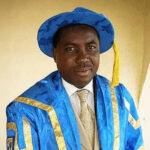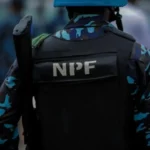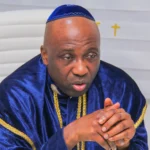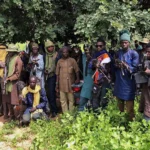Joseph. Amaoru
Contents
Education is the process of acquiring knowledge, skills and character through learning, study and observation. The process may be formal, as done in institutions like schools or informal, like undergoing an apprenticeship. The Easterners of Nigeria have a peculiar training method of indentureship, whereby a boy learns a trade by serving a master and observing his ways and learning the tricks of the trade for an agreed period of time, usually between five and seven years. On completing the training to the satisfaction of the master, the boy is settled by the master handsomely to start his own trade or business. So many Easterners of Nigeria have made good through this training method. Lately, this notable training method is declining for reasons of failure on the part of society to grow indigenous methods of doing things for preference, foreign methods that have kept us underdeveloped perpetually.The Western part of Nigeria. also had a peculiar method of upbringing children, whereby children at very early ages are encouraged to learn trades, even when attending formal schools. The trade to learn may be bricklaying, vulcanising, electrical fitting installation, roofing, carpentry, tailoring, etc. The idea was for every young child to have at least a trade to depend on. It is referred to as handwork. The Yoruba language for the phenomenon is *ise owo*. Even this is declining in relevance, so much so that nowadays artisans in çities in the West of Nigeria are mostly from our neighbouring countries. Every family now aims for medical doctors, lawyers, engineers, accountants, managers, architects, etc. We now aim for the top of the employment hierarchy without workers. Nothing wrong with aiming for the top, but it has to be planned without creating a vacuum like we are experiencing in our national development trajectory.Before now, mostly in the fifties, sixties and early seventies, when the emphasis was not on paper qualifications and credentials, we had business tycoons from the West, East and North who provided the essential services to run the economy. We had Odutola Brothers from the West, Sir Louis Philip Chukuemeka Ojukwu of the Armels Transport fame from the East and the Dantata Group from the North. Dangote is a scion of the Dantata Group. These renowned business tycoons were not persons of high formal educational attainment but were people of high experiential and practical attainment in their chosen fields of specialisation. We knew of Odutola tyres. Odutola used to manufacture tyres in the early seventies. Rubber is the basic raw material for the manufacture of tyres, which we have in abundance, yet we cannot harness it because of the education model that places too much importance on paper qualifications rather than practicality and results. Now, there is no tyre manufacturing company in Nigeria.With our population explosion, if our educational curriculum were right, we should have produced thousands if not millions, of such great business tycoons.In our meeting *(GPAAN and OMNIVERSITY),* Professor Tokunbo Akeredolu-Ale of Omniversity on Saturday, October 18, 2025, during our discussion session, quipped, In those days, we used to produce, where did we go wrong? The answer was that the change in leadership from democratic civil rule to military dictatorship had a crippling effect on the country. The reason for the negative effect was that the military centralised governance and, in the process, killed competition and depended on a single product in the name of crude oil. It brought cheap money and left the country unproductive and declining into poverty. The military did not improve the industrial base, and neither did they offer a functional educational system. Instead, they relied on the rote learning methods of cramming and regurgitation, which is inferior to learning through experience, practice, innovation and results-based methods.For instance, for almost thirty years of military rule, the electricity problem could not be fixed. It is yet to be fixed because of the vestiges of military rule. But we must look beyond the military era and develop an innovative educational curriculum that will lead to the development of our country, because education is the key to development.Education is the process of acquiring knowledge and skills for the purpose of solving problems.A new institution has arrived in Nigeria with the aim of changing the curriculum from paper qualifications and credentials-based assessment model to an experience and practice-based model with emphasis on results rather than paper qualifications. And that institution is Omniversity.Omniversity Imperial College LLC is the world’s first and only ISO Certified University issuing ISO Aligned Practice Qualifications, uniquely combining recognised international quality standards with additional accreditations and memberships from the UK and USA.It is registered in Missouri as a long-distance learning by correspondence institution.It is also registered and recognised by the Lagos State government of Nigeria. It has the mission to empower students with globally relevant knowledge through innovative AI-powered education, professional development, skill recognition and Accreditation of Prior Experiential Learning.Its vision is to be a leader in distance skill recognition, Accreditation of Prior Experiential Learning, AI-driven education and professional training, ensuring accessibility and excellence in academic and career pursuitsAt Omniversity, you can earn an ISO Aligned, *Bachelor of Practice Qualification or Diploma,* in any field of your experiential learning and skill application. The program is designed to prepare professionals with hands-on on for their careers.Prospective students can further earn an ISO Aligned,*Master of Practice Qualification.*This qualification shall be evaluated on an advanced practice-based qualification emphasising applied expertise, focusing on industry-relevant skills, project implementation and innovation.At the peak, a qualified candidate can earn an ISO Aligned,*Doctor of Practice Qualification,* for recognition in the mastery of a specialised professional field.You can become an ISO Aligned, *Professor of Practice,* which is a Prestigious academic and professional recognition of contributions to a field through practice, innovation, and leadership, which is awarded to distinguished professionalsProspective students who have distinguished themselves can bag a prestigious ISO Aligned, *Distinguished Fellowship.*This is a formal acknowledgement of an enduring contribution to a field. And honouring those whose practice-based insights and real-world impact reflect excellence beyond academic tradition.ISO stands for International Organisation for Standardisation.This is an independent non-governmental body that develops and publishes international standards for various industries, technologies and processes. Its goal is to ensure that products and services are safe, reliable and of good quality.At the helm of affairs of Omniversity is the President and Chairman, Board of Trustees, Professor Tokunbo Akeredolu-Ale, who is an eloquent and erudite scholar and Professor of Artificial Intelligence Powered Marketing Communications, Leadership, Organisational & Risk Management.It is envisaged that this innovation in our educational curriculum will be well received to propel us from under development to development in a very short while. After all, we have the good fortune of fair weather all year round. We are also extremely rich in raw materials and solid minerals. These are in addition to a huge human resources base that has remained untapped. This innovation in educational curriculum is to tap the human resources _base because that is the greatest asset for the development_ of Nigeria.Joseph Amaoru Wrote From Lagos
Education is the process of acquiring knowledge, skills and character through learning, study and observation. The process may be formal, as done in institutions like schools or informal, like undergoing an apprenticeship. The Easterners of Nigeria have a peculiar training method of indentureship, whereby a boy learns a trade by serving a master and observing his ways and learning the tricks of the trade for an agreed period of time, usually between five and seven years. On completing the training to the satisfaction of the master, the boy is settled by the master handsomely to start his own trade or business. So many Easterners of Nigeria have made good through this training method. Lately, this notable training method is declining for reasons of failure on the part of society to grow indigenous methods of doing things for preference, foreign methods that have kept us underdeveloped perpetually.
The Western part of Nigeria. also had a peculiar method of upbringing children, whereby children at very early ages are encouraged to learn trades, even when attending formal schools. The trade to learn may be bricklaying, vulcanising, electrical fitting installation, roofing, carpentry, tailoring, etc. The idea was for every young child to have at least a trade to depend on. It is referred to as handwork. The Yoruba language for the phenomenon is *ise owo*. Even this is declining in relevance, so much so that nowadays artisans in çities in the West of Nigeria are mostly from our neighbouring countries. Every family now aims for medical doctors, lawyers, engineers, accountants, managers, architects, etc. We now aim for the top of the employment hierarchy without workers. Nothing wrong with aiming for the top, but it has to be planned without creating a vacuum like we are experiencing in our national development trajectory.
Before now, mostly in the fifties, sixties and early seventies, when the emphasis was not on paper qualifications and credentials, we had business tycoons from the West, East and North who provided the essential services to run the economy. We had Odutola Brothers from the West, Sir Louis Philip Chukuemeka Ojukwu of the Armels Transport fame from the
East and the Dantata Group from the North. Dangote is a scion of the Dantata Group. These renowned business tycoons were not persons of high formal educational attainment but were people of high experiential and practical attainment in their chosen fields of specialisation.
We knew of Odutola tyres. Odutola used to manufacture tyres in the early seventies. Rubber is the basic raw material for the manufacture of tyres, which we have in abundance, yet we cannot harness it because of the education model that places too much importance on paper qualifications rather than practicality and results. Now, there is no tyre manufacturing company in Nigeria.
With our population explosion, if our educational curriculum were right, we should have produced thousands if not millions, of such great business tycoons.
In our meeting *(GPAAN and OMNIVERSITY),* Professor Tokunbo Akeredolu-Ale of Omniversity on Saturday, October 18, 2025, during our discussion session, quipped, In those days, we used to produce, where did we go wrong? The answer was that the change in leadership from democratic civil rule to military dictatorship had a crippling effect on the country. The reason for the negative effect was that the military centralised governance and, in the process, killed competition and depended on a single product in the name of crude oil. It brought cheap money and left the country unproductive and declining into poverty. The military did not improve the industrial base, and neither did they offer a functional educational system. Instead, they relied on the rote learning methods of cramming and regurgitation, which is inferior to learning through experience, practice, innovation and results-based methods.
For instance, for almost thirty years of military rule, the electricity problem could not be fixed. It is yet to be fixed because of the vestiges of military rule. But we must look beyond the military era and develop an innovative educational curriculum that will lead to the development of our country, because education is the key to development.
Education is the process of acquiring knowledge and skills for the purpose of solving problems.
A new institution has arrived in Nigeria with the aim of changing the curriculum from paper qualifications and credentials-based assessment model to an experience and practice-based model with emphasis on results rather than paper qualifications. And that institution is Omniversity.
Omniversity Imperial College LLC is the world’s first and only ISO Certified University issuing ISO Aligned Practice Qualifications, uniquely combining recognised international quality standards with additional accreditations and memberships from the UK and USA.
It is registered in Missouri as a long-distance learning by correspondence institution.
It is also registered and recognised by the Lagos State government of Nigeria.
It has the mission to empower students with globally relevant knowledge through innovative AI-powered education, professional development, skill recognition and Accreditation of Prior Experiential Learning.
Its vision is to be a leader in distance skill recognition, Accreditation of Prior Experiential Learning, AI-driven education and professional training, ensuring accessibility and excellence in academic and career pursuits
At Omniversity, you can earn an ISO Aligned, *Bachelor of Practice Qualification or Diploma,* in any field of your experiential learning and skill application. The program is designed to prepare professionals with hands-on on for their careers.
Prospective students can further earn an ISO Aligned,*Master of Practice Qualification.*
This qualification shall be evaluated on an advanced practice-based qualification emphasising applied expertise, focusing on industry-relevant skills, project implementation and innovation.
At the peak, a qualified candidate can earn an ISO Aligned,*Doctor of Practice Qualification,* for recognition in the mastery of a specialised professional field.
You can become an ISO Aligned, *Professor of Practice,* which is a Prestigious academic and professional recognition of contributions to a field through practice, innovation, and leadership, which is awarded to distinguished professionals
Prospective students who have distinguished themselves can bag a prestigious ISO Aligned, *Distinguished Fellowship.*
This is a formal acknowledgement of an enduring contribution to a field. And honouring those whose practice-based insights and real-world impact reflect excellence beyond academic tradition.
ISO stands for International Organisation for Standardisation.
This is an independent non-governmental body that develops and publishes international standards for various industries, technologies and processes. Its goal is to ensure that products and services are safe, reliable and of good quality.
At the helm of affairs of Omniversity is the President and Chairman, Board of Trustees, Professor Tokunbo Akeredolu-Ale, who is an eloquent and erudite scholar and Professor of Artificial Intelligence Powered Marketing Communications, Leadership, Organisational & Risk Management.
It is envisaged that this innovation in our educational curriculum will be well received to propel us from under development to development in a very short while. After all, we have the good fortune of fair weather all year round. We are also extremely rich in raw materials and solid minerals. These are in addition to a huge human resources base that has remained untapped. This innovation in educational curriculum is to tap the human resources _base because that is the greatest asset for the development_ of Nigeria.
Joseph Amaoru Wrote From Lagos







